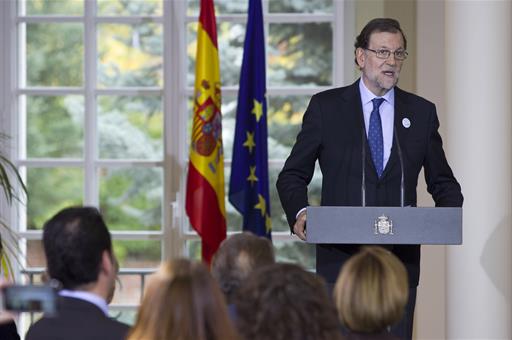Mariano Rajoy stresses that great State pact on gender-based violence "has started to take shape"
President's News - 2016.11.25
Moncloa Palace, Madrid
The first words spoken by President of the Government Rajoy were for "those women who have lost their lives at the hands of their partners or former partners" in the year to date. It is with "affection" and "emotion", he said, that we must hold "these women dear in our memories, together with those children who have been left orphaned and their families".
The President of the Government also addressed those who "continue to suffer some form of abuse in silence", particularly the most vulnerable groups, such as adolescents "who are highly exposed to new forms of violence"; women with some form of disability, "with greater problems in accessing public resources"; older women who, due to their situation of dependence, "have greater difficulties escaping the circle of violence", and children, "who have always been silent victims of the abuse suffered by their mothers".
Spain, a pioneer in fight against gender-based violence
 Mariano Rajoy pointed out that the priority for the whole of Spanish society is to support those women who suffer from gender-based violence so that they can find a way out of the situation. He explained that this means accompanying them during the whole process from the first moment they report it.
Mariano Rajoy pointed out that the priority for the whole of Spanish society is to support those women who suffer from gender-based violence so that they can find a way out of the situation. He explained that this means accompanying them during the whole process from the first moment they report it.
In this regard, the President of the Government highlighted that Spain has been a pioneer nation "in its work to stamp out all forms of violence against women". Although many aspects still exist that can be improved on, "in Spain we have a complete legal system, with high standards of transparency in the figures we publish and a powerful system of resources to provide assistance and protection which has steadily improved as each year passes".
State Pact against gender-based violence
Mariano Rajoy also recalled the progress made during the last term of office; among other things, Spain ratified the Istanbul Convention of the Council of Europe, more than 12 Acts of Parliament were enacted and access to free legal aid was approved for women who are victims of abuse.
Having recalled the commitment he made during the investiture session to "push through a great State pact to combat gender-based violence", the President of the Government pointed out that "this important objective has started to take shape with the unanimous agreement reached by all [parliamentary] groups just ten days ago". Accordingly, a sub-committee has been set up in the Lower House of Parliament to "create the necessary consensus in relation to gender-based violence", as has happened on other issues.
016 helpline: There is a way out
Mariano Rajoy sent out a clear message "to all those women who still suffer from the nightmare of abuse and other forms of violence meted out to them": "There is a way out of your problems and you have the support of everyone to achieve that. Spanish society as a whole is at your side and supports you".
On this point, the President of the Government praised the great work of the "specially qualified" professionals who work for the 016 helpline, an instrument "that acts as the best and easiest gateway to the system and to a return to normality", providing a 24-hour service, 365 days a year, without leaving any record on your phone bill.
Recognition for award-winners
President of the Government Rajoy claimed that the great progress as a result of the political action taken would not have been possible without the "involvement of civil society". The awards handed out today at Moncloa Palace, he said, seek to reward "some of those initiatives that have helped improve very important aspects such as increasing social awareness".
 Pool Moncloa/Diego CrespoThe award-winners this year are: the ANAR Foundation, Save the Children, Salomé Adroher (former Director-General for Children and Families of the Ministry of Health, Social Services and Equality), the Pantallas Amigas initiative, the company Clece, the foundation CERMI Women, the journalist Marta Pastor, the platform ROTAS and the Chief Inspector of Police, José Nieto.
Pool Moncloa/Diego CrespoThe award-winners this year are: the ANAR Foundation, Save the Children, Salomé Adroher (former Director-General for Children and Families of the Ministry of Health, Social Services and Equality), the Pantallas Amigas initiative, the company Clece, the foundation CERMI Women, the journalist Marta Pastor, the platform ROTAS and the Chief Inspector of Police, José Nieto.
According to Mariano Rajoy, "mentioning all these people who carry out such important and necessary work leads me to the certainty that the political and social stakeholders as a whole must continue working together on this shared task".





